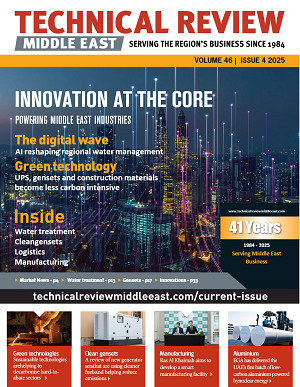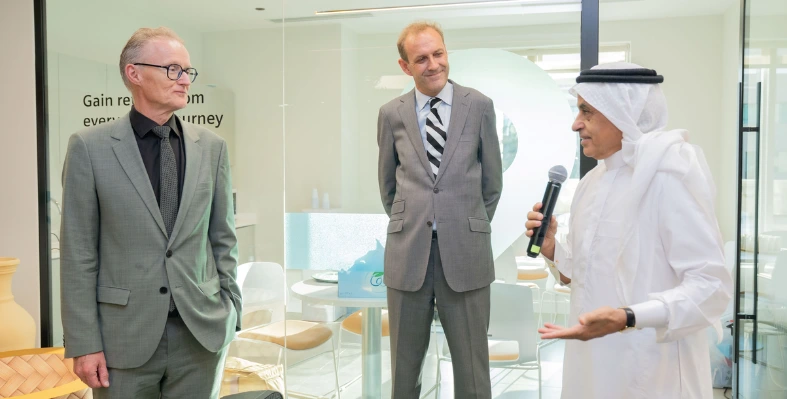In The Spotlight
At last week’s GITEX Global, one of the region’s most influential tech events, Al Masaood Group, has officially signed a Memorandum of Understanding (MoU) with Instagrid – a Global pioneer in portable battery systems – bringing to the UAE the first professional-grade, portable, emission-free energy source.
Who Is Instagrid?
Founded in 2018 by PhD Engineers Sebastian Berning and Andreas Sedlmayr, Instagrid emerged from a simple yet transformative idea: to create a high-performance portable power solution for professionals. While the market was saturated with leisure-focused power supplies, there was a clear gap for robust, mobile energy systems capable of meeting the demands of industries like construction, events, and emergency services. Today, Instagrid powers over 125,000 professionals worldwide, offering clean, reliable energy wherever it’s needed.
What makes Instagrid unique?
Instagrid’s innovation lies in its micro-inverter technology, which replaces traditional generator components such as large fan-cooled inverters with smart, modular battery architecture. Each Instagrid unit contains 144 individual battery cells, intelligently managed to deliver peak power outputs of up to 18,000W - all from a compact, 20kg device.
The flagship product, Instagrid ONE, delivers 3,600W of rated output power, equivalent to the power performance you’d expect from a 5-7 kVA generator, but with zero emissions, no noise, and no fossil-fuel consumption. Instagrid’s innovative technology replicates grid-like power in the form of a pure sinewave, dynamically drawing power from the necessary cells to meet the fluctuating demands of professional equipment - from drills and pumps to welders and lighting systems.
Unlike traditional generators, which must be oversized to handle peak loads (resulting in wasted fuel and idle time), Instagrid delivers power only when needed, instantly and efficiently.
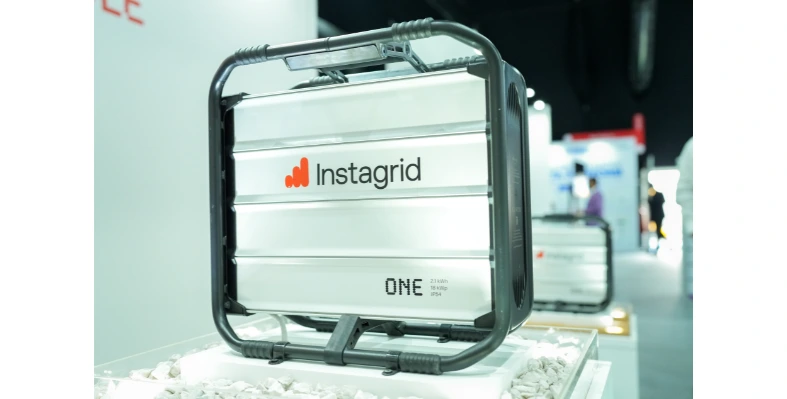
Product range and scalability
∙Instagrid ONE: A compact, robust unit with 2.1 kWh capacity, fully rechargeable in under 3 hours. Built to withstand dust, moisture, and harsh environments.
∙Instagrid LINK: Connects up to three Instagrid ONE units to triple capacity to 6.3 kWh, ideal for high-demand applications like diamond core drilling.
∙Instagrid LINK MAX: Combines three Instagrid ONE units into a portable three-phase power supply, revolutionising the portability of 400 V power sources.
Sustainable by design
Instagrid’s technology is not only clean - it’s circular. The company’s latest Impact Report highlights its commitment to sustainability with impressive headline figures:
∙Over 701,005 tonnes of CO₂e emissions avoided to date - equivalent to removing over 300,000 cars from the road.
∙215,378 tonnes of carbon monoxide (CO) and 279 tonnes of nitrogen oxides (NOx) emissions avoided to date, improving air quality.
∙96% product repair rate, with a Material Circularity Index of 48%.
∙91% material recyclability at end of life for Instagrid ONE and similarly high scores across the product line.
Instagrid’s supply chain and manufacturing processes align with the EU’s latest sustainability standards, ensuring long-term product durability and responsible resource use.
Cost efficiency compared to generators
Beyond environmental benefits, Instagrid offers compelling economic advantages. Based on 5 years average usage an Instagrid unit will reduce total lifetime costs by an average 70%* when compared with a similar sized combustion generator (*based on local market costs) - thanks to savings on fuel, maintenance, accessories, and downtime.
Global trust and adoption
Today, Instagrid stands as Europe’s leading provider of high-performance portable power systems, rapidly expanding its footprint across North America, Australia, Singapore, and, most recently, the UAE. Instagrid has become the portable power solution of choice for leading global contractors like Strabag and Balfour Beatty, and rental giants such as Sunbelt Rentals, who have invested heavily to meet growing demand for sustainable energy.
Strategic partnership with Al Masaood Power
Instagrid’s entry into the UAE market is powered by its partnership with Al Masaood Power, who have a deep heritage of over 50 years driving UAE’s industrial and energy sectors with innovative solutions. a leading energy solutions provider in the region. As the official distributor, Al Masaood will make Instagrid’s full product portfolio - including Instagrid ONE, LINK, and LINK MAX - immediately available across the Emirates.
Supporting the UAE’s Net Zero 2050 Vision
This partnership will support the UAE’s Net Zero 2050 strategy and Al Masaood Power’s innovation roadmap.
By leveraging Instagrid’s proven success in Europe and adapting it to the unique needs of the UAE and GCC markets, this collaboration aims to accelerate the transition to clean portable power across key sectors including construction, infrastructure, utilities, and emergency services.
For more details, visit Instagrid and Al Masaood Group.
IVECO and its long-term partner MTT, through EuroMT Srl bodybuilder, have begun delivering 20 Eurocargo units to the Directorate of Civil Defense in Iraq.
The first batch of Eurocargo ML180E28 4x2 models marks the debut of firefighting water tankers in Iraq. Each vehicle is equipped with a EuroMT Srl 10,000-litre water tank and a high-performance firefighting pump system, designed to offer flexibility, efficiency, and rapid emergency response capabilities.
Machine Technology Trading Co. (MTT), an official IVECO dealer for several years, is headquartered in Baghdad with a secondary branch in Erbil, Kurdistan Region. The company provides full coverage across Iraq, offering the complete range of IVECO trucks.
Khalid O. Mawlood, general manager of MTT, said, "We are proud that our local Governorate has chosen our company together with IVECO brand for the fleet of firefighting vehicles and we hope to serve this mission as always we did in the past and we will continue to do."
Ali Sheikholmoloki, IVECO business manager for Iraq, added, “In this special year, which IVECO is turning to 50 years, we are celebrating together with our historical partner MTT the delivery of 20 Eurocargo units firefighting water tankers equipped to Al Diwanya Governorate in Iraq. I can proudly say that Eurocargo is the most versatile vehicle in its category which surely will bring us many more achievements in this market for different segments.”
Eurocargo: a multi-mission truck
Eurocargo stands out as a symbol of reliability, flexibility, and versatility. Designed for a fast-changing and competitive market, the model combines strength and agility with a refreshed design that enhances both aesthetics and performance.
Available in over 11,000 variations, the Eurocargo range includes seven gross vehicle weight options, four power ratings, seven gearboxes, and three cab types to meet any operational requirement. Its bumper design allows easy access to the windscreen, while LED Daytime Running Lights and optional Xenon headlights ensure safer night driving. Every design detail, from the reshaped deflector to the UV-filtered windscreen, improves aerodynamics and comfort.
Cab options for every mission
Eurocargo offers three cab types — Day, Sleeper, and Crew — each available with two roof heights. The Day cab is suited for urban use, balancing width and length for ease of manoeuvrability. The Sleeper cab, available in standard or high roof versions, offers overnight accommodation with one or two bunks and up to 260 litres of internal storage. The Crew cab, ideal for construction and emergency services, carries up to six passengers plus the driver, along with essential tools and equipment.
Saudi Arabia will host the first Hydrogen Arabia Summit & Exhibition on 8–9 December 2025 at the Crowne Plaza Riyadh RDC, positioning the Kingdom as a global hub for hydrogen and clean energy collaboration.
Organised by RX, the company behind the World Hydrogen Summit, the event will feature a high-level conference and exhibition uniting senior government officials, global energy leaders, investors, and innovators in hydrogen and carbon capture technologies.
Over two days of strategic dialogue and technology showcases, discussions will focus on how hydrogen and carbon capture can accelerate Saudi Arabia’s Vision 2030 and Net Zero 2060 ambitions. The event will also emphasise the Kingdom’s Circular Carbon Economy framework, introduced during its G20 Presidency, which promotes comprehensive emissions management and energy stability.
Financial push
Saudi Arabia has pledged over SAR 1 trillion (US$270bn) to the power sector, including SAR880bn Saudi Riyals (US$235bn) dedicated to renewables. Major projects such as the NEOM green hydrogen initiative and a US$10bn investment from the Public Investment Fund highlight the Kingdom’s determination to become a global hydrogen leader.
Vasyl Zhygalo, managing director, Middle East and Emerging Markets, RX, Hydrogen Arabia, said, “Hydrogen Arabia marks a significant milestone for us as we expand our global energy portfolio into Saudi Arabia, which is one of the most dynamic markets for clean energy transformation. This event will serve as a crucial platform for regional and international leaders to collaborate on advancing hydrogen and carbon capture solutions. It will also create new opportunities for investment, innovation, and long-term energy security. In doing so, the event will reinforce Saudi Arabia's position as a hub for sustainable energy and a key player in international hydrogen trade.”
Speakers from IRENA, ENOWA-NEOM, SEFE, Air Liquide, Hy24, and Aramco Ventures will discuss investment, global demand, certification, and decarbonisation. “The agenda for the Hydrogen Arabia Summit will gather regional and international leaders to explore how investment and policy can speed up the adoption of technology. By concentrating on practical pathways for hydrogen and CCUS, the discussions in Riyadh aim to produce outcomes that promote both industry growth and global trade,” added Zhygalo.
The world is falling behind on renewable energy and efficiency goals, despite record capacity growth in 2024, according to a new report from the International Renewable Energy Agency (IRENA), the COP30 Brazilian Presidency, and the Global Renewables Alliance (GRA).
Global renewable capacity additions reached 582 GW last year, yet the COP28 UAE Consensus target of tripling renewables to 11.2 TW by 2030 now requires 1,122 GW annually, with 16.6% growth needed each year. Energy efficiency also lags, with global energy intensity improving by just 1% in 2024—far below the 4% annual gains needed to meet UAE Consensus goals.
The report calls for urgent action: integrating renewable targets into national climate plans, doubling collective NDC ambition, and scaling investment in renewables to at least USD 1.4 trillion annually through 2030.
United Nations Secretary-General António Guterres said, “The clean energy revolution is unstoppable. Renewables are deployed faster and cheaper than fossil fuels – driving growth, jobs, and affordable power. But the window to keep the 1.5°C limit within reach is rapidly closing. We must step up, scale up and speed up the just energy transition – for everyone, everywhere.”
IRENA Director-General Francesco La Camera added, “The world has broken renewable capacity records, but records alone will not keep 1.5°C alive. Renewables are not just the most cost-effective climate solution; they are the biggest economic opportunity of our time. This report shows the path: accelerate deployment, modernise grids, scale clean-tech and strengthen supply chains.”
Ben Backwell, Chair of the GRA, said, “The private sector is driving the energy transition, providing three-quarters of global clean energy investment… What we need now are long-term government plans that match national ambitions; we need pipelines that deliver projects.”
The report highlights that G20 nations must lead, contributing over 80% of global renewable capacity by 2030, while advanced economies should ramp up climate finance and investment in grids, storage, and clean-tech supply chains to secure a stable energy transition.
Trinasolar, a global leader in smart PV and energy storage solutions, showcased its latest innovations at Solar & Storage Live KSA 2025, held from 12 to 14 October at the Riyadh Front Exhibition & Conference Center.
The company reaffirmed its long-term commitment to Saudi Arabia’s Vision 2030 through advanced innovation, localisation, and sustainable industrial growth.
At the exhibition, Trinasolar presented a complete portfolio tailored to the Kingdom’s clean-energy ambitions, featuring the Vertex N module (NEG21C.20) with power output up to 740 watts and the Elementa 3 energy storage platform alongside TrinaTracker systems and Trinabot BUILDEX, an AI-driven robotic cleaning solution. Together, these technologies offer an integrated solar and storage solution designed to boost efficiency, reliability, and long-term performance across utility-scale and commercial-industrial projects.
Trinasolar continues to deepen its investment in Saudi Arabia through local manufacturing and technology transfer. The company has achieved the 35% localisation rate required by the Saudi government, with higher rates in select projects, supported by its TrinaTracker factory in Jeddah. Established under a land-lease agreement with MODON in the Third Industrial City, the facility has an annual production capacity of 3GW, enabling faster delivery and stronger local integration.
“Reaching the government’s required localisation rate at our projects is a significant milestone that demonstrates Trinasolar’s deep commitment to Saudi Arabia’s Vision 2030,” said Todd Li, head of Asia Pacific, Middle East & Africa (APMEA) at Trinasolar. “With more than 57 gigawatts of solar and energy storage projects tendered under the National Renewable Energy Programme, the Kingdom is entering a transformative phase, and we are well positioned to contribute to this growth through our full range of advanced technologies and integrated smart-energy solutions that support the Kingdom’s evolving energy needs.”
Key features
Built on Trinasolar’s 210mm n-type i-TOPCon technology, the Vertex N 740W module achieves up to 23.8% efficiency, reduced LCOE, and strong reliability in high-temperature environments. The Elementa 3 platform enhances energy density, safety, and operational performance with high-capacity 587Ah cells and intelligent temperature control for stability even at 55°C. The Trinabot BUILDEX robotic cleaning solution further improves O&M performance and long-term energy yield, helping developers maximise uptime and investment value.
During the exhibition, Trinasolar announced strategic collaborations to strengthen its regional presence. The company welcomed Sky Energy as its new distributor in Saudi Arabia, expanding access to its advanced solar solutions to support the Kingdom’s clean-energy goals. Additionally, Trinabot and MAN signed a cooperation agreement focused on photovoltaic installation robotics, combining expertise to accelerate intelligent installation practices across the Middle East and Africa.
With over 28 years of continuous innovation, more than 200GW of cumulative 210mm module shipments, and 12GWh of global energy storage shipments, Trinasolar remains a trusted partner in advancing the energy transition across the Middle East and Africa, empowering the region to harness solar power for a sustainable future.
Read more:
Mubadala Energy reports strong ESG progress in 2024
Construction projects are growing in scale and complexity, demanding smarter ways to manage cost, time, and performance. ProjectVIEW ERP by DANAOS Projects brings all these elements together in a single platform, helping contractors maintain control and drive efficiency from planning to execution. Read on:
Driving Saudi Arabia’s construction digital transformation
Saudi Arabia’s Vision 2030 places digital transformation at the core of its economic evolution—demanding not just digitisation, but specialised transformation tailored to each sector’s unique workflows. In construction, mining, and project-based fabrication—industries that form an interconnected value chain—success relies on systems capable of managing complexity, cost, and accountability from bid to execution.
As each sector feeds into the other—mining, fabrication, and construction—data integration across all three domains becomes critical to achieving visibility, control, and efficiency throughout the entire project lifecycle.
ProjectVIEW ERP by DANAOS empowers contractors and enterprises across all project-based industries—construction, mining, and fabrication—to build a better world through data-driven precision and unified control. By integrating time, cost, and performance into one intelligent platform, it unifies fragmented processes into a connected value chain—driving efficiency, accountability, and agility for every project-based industry under Vision 2030.
Why Saudi contractors need a construction-specific ERP solution
Despite their size and sophistication, many contractors in KSA still rely on decoupled, non–industry-specific systems—one for finance, another for scheduling, and countless spreadsheets for cost tracking—creating silos that limit visibility, accuracy, and control.
This fragmentation leads to:
• Cost overruns caused by delayed information flow between site and office.
• Inaccurate budgets due to disconnected BoQ and resource data.
• Limited visibility into project progress and productivity.
A construction-specific ERP like DANAOS ProjectVIEW ERP unifies every process—from design and estimation to procurement, fabrication, and site execution—into a single command centre, delivering one version of the truth across all projects and operations.
Developed internationally, DANAOS ProjectVIEW ERP is an industry-specific solution purpose-built for the realities of construction and fabrication in Saudi Arabia. Tailored for Saudi contractors and manufacturers, it delivers an end-to-end project management and cost control ecosystem that enforces accountability, and measurable performance through real-time cost control and analytics, fully aligned with the Kingdom’s operational standards and Vision 2030 objectives.
ProjectVIEW ERP
Unlike generic ERP systems, ProjectVIEW ERP has been designed by construction experts for the construction-specific and project-based manufacturing industries. Its architecture revolves around three fundamental pillars:
• BoQ ↔ WBS ↔ Cost codes integration for absolute project transparency.
• Procurement and warehouse management with eRFQ portals for suppliers and subcontractors.
• Integrated HR, payroll, and machinery management ensuring real cost allocation per project.
This modular approach transforms ProjectVIEW ERP into the definitive construction ERP software in Saudi Arabia, delivering an all-encompassing project cost control system that operates at an enterprise-wide scale and seamlessly integrates with other ERP systems when required.

Fully Compliant with Saudi regulations
Regulatory compliance is a top priority for every Saudi enterprise. ProjectVIEW ERP is ZATCA-compliant—fully supporting Phase 2 e-invoicing with XML file generation, QR codes, and real-time integration with ZATCA’s Fatoora system. DANAOS Projects ensures its solution adheres to Saudi VAT ERP system rules and provides seamless e-invoicing software workflows.
Real-time project performance
The BoQ–WBS–Cost Code integration is ProjectVIEW’s DNA. This triad delivers real-time construction performance monitoring, linking planning, cost control, and execution into a single data model.
Contractors gain immediate insights into budget-versus-actual performance, resource productivity, and deviation alerts—empowering project managers to take corrective actions before overruns occur while aligning financial outcomes with project costs and payments.
Seamless integration with multiple systems
ProjectVIEW ERP operates as an centralised ERP ecosystem, natively integrating with Oracle Primavera, Microsoft Project, and BIM systems such as Revit, Navisworks, and Tekla. Through these integrations, ProjectVIEW synchronises schedules, quantities, and costs—delivering a unified digital thread across planning, design, and execution. This ensures total synchronisation between Primavera integration ERP, BIM ERP Saudi Arabia, and construction scheduling integration environments.
Cloud-ready and scalable
Built and running on a Microsoft Azure Cloud environment—private and dedicated to each client—or deployed directly on the client’s preferred premises, ProjectVIEW ERP is cloud-ready and fully scalable, making it ideal for Saudi Arabia’s giga-projects and multi-tenant environments such as NEOM, The Red Sea, Diriyah Gate, and Qiddiya. Its architecture enables multi-company, multi-project, and multilingual environments, providing centralised control with distributed access across contractors, consultants, suppliers and subcontractors.
ProjectVIEW ERP is hosted on ISO-certified cloud infrastructure, complying with:
• ISO 27001 (Information Security)
• ISO 20000 (IT Service Management)
• ISO 9001 (Quality Management)
• ISO 27018 (Data Protection)
• ISO 14001 (Environmental Management)
ProjectVIEW ERP transforms financial management into a live performance cockpit. Through real-time dashboards, cash-flow projections, and budget vs. actual analytics, financial managers gain a consolidated view across multiple projects. The system integrates directly with accounts payable, receivables, and subcontractor ledgers—delivering true project accounting system KSA functionality. For executives, it offers predictive insights that drive profitability through robust construction finance management software dashboards .
Why leading Saudi contractors choose ProjectVIEW ERP
From large EPC contractors to infrastructure developers and marine construction firms, Saudi Arabia’s leading companies rely on ProjectVIEW ERP to achieve operational excellence. By enforcing a unified project structure (BoQ–WBS–Cost Codes), ensuring ZATCA compliance, and supporting both office-to-site collaboration and mobile access, ProjectVIEW ERP has established itself as the top ERP software Saudi Arabia and the preferred construction management ERP system for visionary contractors driving Vision 2030.
Eurovent Middle East, in collaboration with the Air Movement and Control Association (AMCA), will host the second edition of the Middle East Industry Congress – HVACR Next Generation: Sustainability in Extreme Conditions – on 28 October 2025 at the InterContinental Durrat Al Riyadh Resort & Spa, Saudi Arabia.
Supported by leading HVACR manufacturers, the event will bring together government officials, industry leaders, and stakeholders to discuss the challenges and opportunities shaping the future of the HVACR sector in one of the world’s most demanding climates.
According to ‘Research and Markets’, the GCC construction market is valued at SAR666bn in 2025 and projected to reach SAR850bn by 2030, growing at a CAGR of more than 5% during the forecast period.
This rapid growth is expected to drive robust demand for HVACR equipment, reinforcing the sector’s vital role in a region where cooling represents up to 80% of building energy consumption and more than 50% of total national energy use.
Adopting to climatic changes
“With sustainability, energy efficiency, the refrigerant transition, and Indoor Air Quality (IAQ) at the forefront of regional priorities, this congress will highlight the essential role of HVACR in reducing greenhouse gas emissions while delivering reliable and affordable cooling, ventilation, and refrigeration solutions,” said Markus Lattner, managing director of Eurovent Middle East. “As rising temperatures and extreme conditions intensify across the region, our sector is central to balancing climate action with economic growth.”
Hassan Abou Jawhar, director Europe and Middle East of AMCA, added, “Eurovent Middle East and AMCA remain committed to advancing technical regulations and minimum energy performance standards across a wide range of HVACR products and technologies. By fostering dialogue between policymakers and industry, this congress will accelerate the adoption of innovative solutions and chart a more sustainable pathway for the future of cooling and ventilation.”
The congress will also feature the regional launch of Desert Certification, the first high-ambient performance certification tailored specifically for the Middle East, ensuring HVACR products are tested and proven under the region’s extreme climatic conditions.
The programme will include keynote addresses from international experts and panel discussions featuring representatives from government, regulatory authorities, and industry. Afternoon sessions will highlight practical solutions and next-generation technologies, showcasing case studies that demonstrate the business case for sustainability, from the refrigerant transition in high-ambient countries to energy-efficient projects designed to improve indoor air quality.
Read more:
ACCIONA unveils Atlas to drive safer, greener construction
Caterpillar unveils C32B engine with enhanced power and durability
Saudi Arabia will host the first Hydrogen Arabia Summit & Exhibition on 8–9 December 2025 at the Crowne Plaza Riyadh RDC, positioning the Kingdom as a global hub for hydrogen and clean energy collaboration.
Organised by RX, the company behind the World Hydrogen Summit, the event will feature a high-level conference and exhibition uniting senior government officials, global energy leaders, investors, and innovators in hydrogen and carbon capture technologies.
Over two days of strategic dialogue and technology showcases, discussions will focus on how hydrogen and carbon capture can accelerate Saudi Arabia’s Vision 2030 and Net Zero 2060 ambitions. The event will also emphasise the Kingdom’s Circular Carbon Economy framework, introduced during its G20 Presidency, which promotes comprehensive emissions management and energy stability.
Financial push
Saudi Arabia has pledged over SAR 1 trillion (US$270bn) to the power sector, including SAR880bn Saudi Riyals (US$235bn) dedicated to renewables. Major projects such as the NEOM green hydrogen initiative and a US$10bn investment from the Public Investment Fund highlight the Kingdom’s determination to become a global hydrogen leader.
Vasyl Zhygalo, managing director, Middle East and Emerging Markets, RX, Hydrogen Arabia, said, “Hydrogen Arabia marks a significant milestone for us as we expand our global energy portfolio into Saudi Arabia, which is one of the most dynamic markets for clean energy transformation. This event will serve as a crucial platform for regional and international leaders to collaborate on advancing hydrogen and carbon capture solutions. It will also create new opportunities for investment, innovation, and long-term energy security. In doing so, the event will reinforce Saudi Arabia's position as a hub for sustainable energy and a key player in international hydrogen trade.”
Speakers from IRENA, ENOWA-NEOM, SEFE, Air Liquide, Hy24, and Aramco Ventures will discuss investment, global demand, certification, and decarbonisation. “The agenda for the Hydrogen Arabia Summit will gather regional and international leaders to explore how investment and policy can speed up the adoption of technology. By concentrating on practical pathways for hydrogen and CCUS, the discussions in Riyadh aim to produce outcomes that promote both industry growth and global trade,” added Zhygalo.
Leading motor and drive manufacturer WEG will present its latest energy-efficient technologies at Global Water Expo 2025, held from 2-4 September at Riyadh Front Exhibition & Conference Center.
Exhibiting at stand 1B41, Hall 1, WEG will highlight solutions designed to advance sustainable water infrastructure in the Middle East.
Among the innovations on display will be the W23 Sync+ motor, a hybrid combining PM, ferrite or neodymium magnets and SynRM technologies, achieving IE5 and anticipated IE6 efficiency ratings — the highest currently available. Designed for pumps, compressors and high-load applications, the motor delivers maximum energy savings while lowering total cost of ownership and CO₂ emissions.
Visitors will also see the W80 AXgen axial flux motor, offering up to 96.9% efficiency in a lightweight, compact design, along with the CFW line of VSDs for scalable process control, the ADV200-SP solar-powered drive, and WG20/WG50 gearboxes for high torque transmission.
“Water is a critical resource in the Middle East, where growing demand and limited natural supply make efficiency and reliability essential. This means that choosing the right equipment for the job is vital,” commented Raphael Torrano, managing director at WEG Middle East.
“WEG has actively been involved in Middle East water projects, providing motors, drives and transformers for desalination and transmission operations to support the region’s national infrastructure and to advance sustainability. We’re committed to the global energy transition, supporting regional and national climate goals through technologies that improve efficiency and reduce emissions.”
Eurovent Middle East, in collaboration with the Air Movement and Control Association (AMCA), will host the second edition of the Middle East Industry Congress – HVACR Next Generation: Sustainability in Extreme Conditions – on 28 October 2025 at the InterContinental Durrat Al Riyadh Resort & Spa, Saudi Arabia.
Supported by leading HVACR manufacturers, the event will bring together government officials, industry leaders, and stakeholders to discuss the challenges and opportunities shaping the future of the HVACR sector in one of the world’s most demanding climates.
According to ‘Research and Markets’, the GCC construction market is valued at SAR666bn in 2025 and projected to reach SAR850bn by 2030, growing at a CAGR of more than 5% during the forecast period.
This rapid growth is expected to drive robust demand for HVACR equipment, reinforcing the sector’s vital role in a region where cooling represents up to 80% of building energy consumption and more than 50% of total national energy use.
Adopting to climatic changes
“With sustainability, energy efficiency, the refrigerant transition, and Indoor Air Quality (IAQ) at the forefront of regional priorities, this congress will highlight the essential role of HVACR in reducing greenhouse gas emissions while delivering reliable and affordable cooling, ventilation, and refrigeration solutions,” said Markus Lattner, managing director of Eurovent Middle East. “As rising temperatures and extreme conditions intensify across the region, our sector is central to balancing climate action with economic growth.”
Hassan Abou Jawhar, director Europe and Middle East of AMCA, added, “Eurovent Middle East and AMCA remain committed to advancing technical regulations and minimum energy performance standards across a wide range of HVACR products and technologies. By fostering dialogue between policymakers and industry, this congress will accelerate the adoption of innovative solutions and chart a more sustainable pathway for the future of cooling and ventilation.”
The congress will also feature the regional launch of Desert Certification, the first high-ambient performance certification tailored specifically for the Middle East, ensuring HVACR products are tested and proven under the region’s extreme climatic conditions.
The programme will include keynote addresses from international experts and panel discussions featuring representatives from government, regulatory authorities, and industry. Afternoon sessions will highlight practical solutions and next-generation technologies, showcasing case studies that demonstrate the business case for sustainability, from the refrigerant transition in high-ambient countries to energy-efficient projects designed to improve indoor air quality.
Read more:
ACCIONA unveils Atlas to drive safer, greener construction
Caterpillar unveils C32B engine with enhanced power and durability
One year after commissioning the world’s largest lithium ore sorting facility, Pilbara Minerals is reaping substantial rewards from TOMRA Mining’s advanced sensor-based sorting technology at its Pilgangoora Operation in Western Australia.
The technology has helped deliver the strongest quarterly production figures of FY25, significantly lowered operating costs, and improved overall resource utilisation.
The June Quarter FY25 results underline this transformation. Pilbara Minerals reported a 77% increase in production volumes and a 10% reduction in unit operating costs (FOB) compared with the previous quarter.
These impressive gains are attributed to the ramp-up of the P1000 expansion and the seamless integration of TOMRA Mining’s high-precision sorting systems. By unlocking value from ore that was previously uneconomical to process, the operation is improving both profitability and sustainability.
Commissioned in August 2024 as part of the P680 Expansion Project, the state-of-the-art crushing and sorting plant boasts a capacity exceeding 1,000 tonnes per hour, making it the largest lithium ore sorting facility in the world. At the heart of its success is TOMRA Mining’s sensor-based technology, which enables early waste rejection during processing.
This approach not only enhances lithium recovery rates and final product quality but also reduces energy usage and minimises environmental impact.
The facility addresses one of the core challenges in lithium mining—efficiently managing spodumene ore embedded within barren host rock. It operates with 10 high-precision TOMRA sorters, each tailored to specific particle sizes: four TOMRA COM Tertiary XRT units for fine material, three TOMRA COM XRT 2.0 units for mid-sized particles, and three TOMRA PRO Primary Color sorters for coarse material.
This targeted sorting removes waste material at an early stage, which streamlines downstream processing, cuts annual energy consumption by an estimated 8–15 GWh, and ensures a consistently high-quality lithium product.
The project’s delivery was the result of years of collaboration between TOMRA Mining, Pilbara Minerals, and engineering partner DRA Global. Extensive test work at TOMRA’s Sydney Test Center confirmed the technology’s ability to maintain high lithium recovery and effective waste separation across varying ore types. The facility was completed on time and on budget, demonstrating the strength of the partnership and the operational readiness of the technology.
From a strategic perspective, the sorting facility supports Pilbara Minerals’ long-term objectives of cost optimisation and sustainable growth. It expands the Pilgangoora Operation’s production capacity while establishing the foundation for further growth through the P2000 project, for which feasibility studies are already underway.
With the P1000 expansion fully operational and the next phase of growth in motion, the Pilgangoora Operation stands as a benchmark for innovation in the lithium mining sector.
In the world of electrical engineering, clarity and precision are key. A professional panel builder understands that clear identification is just as important as the wiring itself.
With professional-grade labels and label printers, you can easily meet customer identification requirements and provide clear insight into even the most complex panels.
Reliability you can count on
Just like a quality panel is built to last, so too should its labels. Industrial-grade labels are designed by Brady engineers to meet various requirements for panel identification. They're engineered to remain legible and stay attached when exposed to a variety of elements, including UV light, humidity, and moisture. Customers can choose labels that fully comply with demanding marine, aviation, and defense standards. Technical data sheets are available to provide insight into label test results, helping you choose the right product for the job.
Clear, immediate insight
A cluttered or poorly labelled panel can lead to errors and safety issues. By using quality labels, you can provide immediate insight into the panel's layout and components. A wide variety of labels are available in different sizes, colours, and profiles. With clear print and various options, you can effectively identify any safety risk, cable, or component in an electrical panel. This includes controllers, I/O modules, power supplies, circuit breakers, terminal and distribution blocks, relay modules, starters, and heavy-duty connectors. Properly identifying these components makes maintenance easier and improves safety.
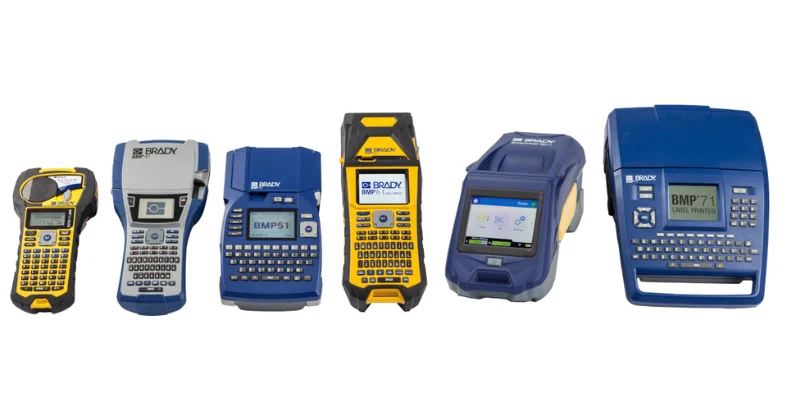
Fast and easy
Gone are the days of handwritten labels that can fade or fall off. Electrical panel labels can be printed efficiently on-site using a wide range of label printers. All you need are a few label rolls and a suitable printer to have a variety of panel labels at your command. The flexibility of having both benchtop and portable systems means you can print labels in the workshop or on the job site. With specialised software, you can easily design, serialise, and print the labels you need, ensuring a consistent and professional result every time. This speed and ease of use save you time and provide a professional-looking final product.
Want to see the benefits of reliable panel identification at a glance? View the infographic on Brady’s website for a quick visual guide to a more professional and efficient workflow.
Brady Corporation in Middle East
www.bradymiddleeast.com
His Highness Sheikh Theyab bin Mohamed bin Zayed Al Nahyan, Member of the Executive Council and Chairman of Etihad Rail, has witnessed the signing of a preliminary agreement to establish a new bonded rail corridor between Khalifa Port in Abu Dhabi and Fujairah Terminals.
The agreement, signed by Etihad Rail, Abu Dhabi Customs, Fujairah Customs, Abu Dhabi Ports Group, Fujairah Terminals, and Noatum Logistics, was announced during the second edition of Global Rail 2025. The initiative is set to enhance the efficiency, safety, and integration of rail transport across the UAE.
Sheikh Theyab welcomed the project as a milestone in strengthening the nation’s logistics and trade infrastructure. He said the corridor would reinforce the UAE’s position as a global trade gateway, while also supporting the country’s Net Zero 2050 commitments.
The bonded rail corridor will enable seamless goods movement between Khalifa Port, Fujairah Terminals, and their adjacent free zones. By streamlining customs procedures, the initiative will reduce clearance times, ensure smoother entry and exit processes, and complete final formalities at the destination.
Looking ahead
Through the collaboration, Etihad Rail aims to provide secure, safe, and sustainable cargo transport via the national rail network. Goods shipped through the corridor will also benefit from priority clearance, giving customers a competitive advantage for transit shipments, exports, and domestic trade between Abu Dhabi and Fujairah.
Pilot operations are scheduled to begin in the fourth quarter of 2025. Ahead of the launch, Etihad Rail and its partners are working with authorities and customers to formalise cooperation frameworks, roll out services, and establish performance monitoring mechanisms to guarantee efficiency and quality.
Looking ahead, the corridor will be expanded to additional stations across the network, with new services and technologies introduced to deliver further efficiencies. The project aligns with the UAE’s strategy to modernise customs procedures, improve transport safety, and advance sustainability goals, cementing the country’s role as a hub for regional and global trade.
At last week’s GITEX Global, one of the region’s most influential tech events, Al Masaood Group, has officially signed a Memorandum of Understanding (MoU) with Instagrid – a Global pioneer in portable battery systems – bringing to the UAE the first professional-grade, portable, emission-free energy source.
Who Is Instagrid?
Founded in 2018 by PhD Engineers Sebastian Berning and Andreas Sedlmayr, Instagrid emerged from a simple yet transformative idea: to create a high-performance portable power solution for professionals. While the market was saturated with leisure-focused power supplies, there was a clear gap for robust, mobile energy systems capable of meeting the demands of industries like construction, events, and emergency services. Today, Instagrid powers over 125,000 professionals worldwide, offering clean, reliable energy wherever it’s needed.
What makes Instagrid unique?
Instagrid’s innovation lies in its micro-inverter technology, which replaces traditional generator components such as large fan-cooled inverters with smart, modular battery architecture. Each Instagrid unit contains 144 individual battery cells, intelligently managed to deliver peak power outputs of up to 18,000W - all from a compact, 20kg device.
The flagship product, Instagrid ONE, delivers 3,600W of rated output power, equivalent to the power performance you’d expect from a 5-7 kVA generator, but with zero emissions, no noise, and no fossil-fuel consumption. Instagrid’s innovative technology replicates grid-like power in the form of a pure sinewave, dynamically drawing power from the necessary cells to meet the fluctuating demands of professional equipment - from drills and pumps to welders and lighting systems.
Unlike traditional generators, which must be oversized to handle peak loads (resulting in wasted fuel and idle time), Instagrid delivers power only when needed, instantly and efficiently.

Product range and scalability
∙Instagrid ONE: A compact, robust unit with 2.1 kWh capacity, fully rechargeable in under 3 hours. Built to withstand dust, moisture, and harsh environments.
∙Instagrid LINK: Connects up to three Instagrid ONE units to triple capacity to 6.3 kWh, ideal for high-demand applications like diamond core drilling.
∙Instagrid LINK MAX: Combines three Instagrid ONE units into a portable three-phase power supply, revolutionising the portability of 400 V power sources.
Sustainable by design
Instagrid’s technology is not only clean - it’s circular. The company’s latest Impact Report highlights its commitment to sustainability with impressive headline figures:
∙Over 701,005 tonnes of CO₂e emissions avoided to date - equivalent to removing over 300,000 cars from the road.
∙215,378 tonnes of carbon monoxide (CO) and 279 tonnes of nitrogen oxides (NOx) emissions avoided to date, improving air quality.
∙96% product repair rate, with a Material Circularity Index of 48%.
∙91% material recyclability at end of life for Instagrid ONE and similarly high scores across the product line.
Instagrid’s supply chain and manufacturing processes align with the EU’s latest sustainability standards, ensuring long-term product durability and responsible resource use.
Cost efficiency compared to generators
Beyond environmental benefits, Instagrid offers compelling economic advantages. Based on 5 years average usage an Instagrid unit will reduce total lifetime costs by an average 70%* when compared with a similar sized combustion generator (*based on local market costs) - thanks to savings on fuel, maintenance, accessories, and downtime.
Global trust and adoption
Today, Instagrid stands as Europe’s leading provider of high-performance portable power systems, rapidly expanding its footprint across North America, Australia, Singapore, and, most recently, the UAE. Instagrid has become the portable power solution of choice for leading global contractors like Strabag and Balfour Beatty, and rental giants such as Sunbelt Rentals, who have invested heavily to meet growing demand for sustainable energy.
Strategic partnership with Al Masaood Power
Instagrid’s entry into the UAE market is powered by its partnership with Al Masaood Power, who have a deep heritage of over 50 years driving UAE’s industrial and energy sectors with innovative solutions. a leading energy solutions provider in the region. As the official distributor, Al Masaood will make Instagrid’s full product portfolio - including Instagrid ONE, LINK, and LINK MAX - immediately available across the Emirates.
Supporting the UAE’s Net Zero 2050 Vision
This partnership will support the UAE’s Net Zero 2050 strategy and Al Masaood Power’s innovation roadmap.
By leveraging Instagrid’s proven success in Europe and adapting it to the unique needs of the UAE and GCC markets, this collaboration aims to accelerate the transition to clean portable power across key sectors including construction, infrastructure, utilities, and emergency services.
For more details, visit Instagrid and Al Masaood Group.

The Dammam Independent Sewage Treatment Plant (ISTP) was officially inaugurated earlier this week. (Image source: Metito)
The Dammam Independent Sewage Treatment Plant (ISTP) was officially inaugurated earlier this week.
Delivered by a consortium led by Metito Utilities alongside Mowah and Orascom Construction, the project marks a major step forward in supporting Saudi Vision 2030’s National Water Strategy through an innovative Public–Private Partnership (PPP) framework.
Awarded by the Saudi Water Partnership Company (SWPC), the Dammam ISTP was developed with a total investment of SAR690mn (US$185.26mn) under a 25-year Build–Own–Operate–Transfer (BOOT) model. The plant has an initial capacity of 200,000 m³/day, expandable to 350,000 m³/day, serving nearly one million residents in western Dammam.
The performance-based PPP model mobilizes private sector capital, technology, and expertise to deliver critical infrastructure that meets the Kingdom’s growing water demands.
The plant utilises Integrated Fixed Film Activated Sludge (IFAS) technology, achieving high treatment efficiency while reducing civil works and tank volumes. Its sustainable design incorporates anaerobic digestion to convert sludge into biogas for on-site use, alongside solar drying greenhouses that harness Dammam’s abundant sunlight. These features minimise emissions and reduce operational costs.
Construction, which began in 2020 after financial close, recorded over 6.9 million safe man-hours with zero lost-time incidents (LTIs), created hundreds of local jobs, and enhanced sustainability through resource recovery and reduced landfill dependency. The project contributes directly to several UN Sustainable Development Goals (SDGs), including SDG 6 (Clean Water & Sanitation), SDG 9 (Industry, Innovation & Infrastructure), and SDG 17 (Partnerships for the Goals).
Saint Gobain has announced a new ‘Lead & Grow’ strategic plan, which envisages around €12bn (approx. US$13.95bn) in growth capex and acquisitions globally over the 2026-2030 period
With a focus on light and sustainable construction, the group says it is raising its profitable growth trajectory in the years ahead, and aims to increase its exposure to the non-residential and infrastructure sectors.
“In the current geopolitical context, Saint-Gobain benefits from the powerful operating model it has established and optimised country-by-country, based on local value chains,” said Benoit Bazin, Saint-Gobain’s chairman and CEO.
The group outlined growth plans across major developed regions, including Asia, North America and Europe, especially in the Middle East.
Its latest investments across the region aim to support local manufacturing and sustainability efforts.
Growth across sectors
“We will also expand into new growth markets: in infrastructure, particularly thanks to our established leading position in construction chemicals, and in non-residential, where the group holds key advantages,” added Bazin.
The widening of the group’s product offer over the past few years has opened up new opportunities in non-residential (including educational and healthcare facilities, hotels and data centres) and infrastructure (transport, energy), the company added in a statement.
In the data centre segment, it highlights solutions including focusing on speed of construction, low-carbon partitions and concrete, airflow management and improved thermal insulation.
On the infrastructure side, it said it was targeting niche areas in the bridges and tunnels segment, such as technical waterproofing, specialty admixtures, expansion and injection grouts, repair and protection mortars.
And on the airports side, it highlighted products for runway reinforcement, fire-resistant and fire safety glass, solar controlled façades, technical flooring and acoustic partitions.
Saudi Arabia has awarded exploration licences for 25 sites in the Nabitah–Ad Duwayhi belt, located in the Makkah region, to nine local and international companies and consortia. The winners have committed more than SAR156mn (US$42mn) in exploration spending, according to the Ministry of Industry and Mineral Resources.
The successful bidders include four consortia: Ma’aden–Hancock Prospecting, Ajlan and Bros Mining–Shandong Gold Group, Technology Experts–Andiamo Exploration, and McEwen–Sumo Holding. In addition, five standalone companies secured licences: Al-Eitilaf Al Mumayaz for Mining Company, Saudi Gold Refinery, Batin Al-Ard for Gold, Aurum Global Group, and Almasar Minerals.
The ministry confirmed that competition for the final site, ND26, was suspended after exploration spending bids exceeded technical evaluations and reached levels deemed commercially unfeasible. The site will be re-evaluated according to the approved timeline under the Mining Investment Law.
Further bidding rounds are planned, with competition for an additional 10 sites in the same belt resuming from 16–18 September. Results will be announced after all regulatory procedures are complete. Another 162 mining sites in the Al-Naqrah and Al-Sukhaybirah Safra belts in the Madinah region will be offered from 28 September. These form part of the ministry’s target to make over 50,000 sq km of mineral-rich belts available by 2025.
Saudi Arabia’s mineral resources are estimated at more than SAR9.4tn, underscoring the sector’s role as a cornerstone of Vision 2030. The Al-Baha region alone is valued at nearly SAR285.4bn (US$76bn) and is rich in resources including gold, silver, copper, zinc, lead, feldspar, marble, and pozzolan. The region also contains mineralised belts for gold, copper, and zinc, as well as 19 mining complexes dedicated to building materials.
The Kingdom views mining as a key driver of economic diversification and aims to position the sector as the “third pillar” of its economy alongside oil and petrochemicals. By accelerating exploration and development of its mineral wealth, Saudi Arabia is seeking to enhance its global competitiveness in mining and attract further international investment.
The region’s leading exhibition for metalworking, metal manufacturing, and steel fabrication will return to Sharjah in January 2026, highlighting the UAE’s growing industrial strength and its commitment to safety, efficiency, and sustainability in advanced manufacturing.
Now in its 21st edition, SteelFab 2026 will be held at Expo Centre Sharjah from 12-15 January, bringing together global industry leaders to showcase cutting-edge fabrication technologies, machinery, and safety-focused industrial solutions.
Sharjah’s rapidly growing economy, bolstered by a 361% surge in foreign direct investment to US$1.5bn in the first half of 2025, further underlines the significance of the event. The emirate’s expanding industrial base and strong infrastructure continue to attract global manufacturers and suppliers, reinforcing its role as a hub for innovation and safe production practices.
“SteelFab continues to grow in relevance as the UAE intensifies its focus on industrial development and global trade partnerships,” said H.E. Saif Mohamed Al Midfa, CEO, Expo Centre Sharjah.
“The UAE’s industrial sector is witnessing unprecedented growth. The event reflects the country’s strategic direction, where policy support, innovation, and international collaboration are driving a new era of industrial growth and competitiveness.”
The UAE’s industrial outlook remains optimistic, with GDP forecast to grow by 4.9% in 2025 and 5.3% in 2026. With over US$11bn in financing directed toward industrial companies, the country’s manufacturing ecosystem is poised for expansion, underpinned by strong regulatory standards and safety-driven innovation.
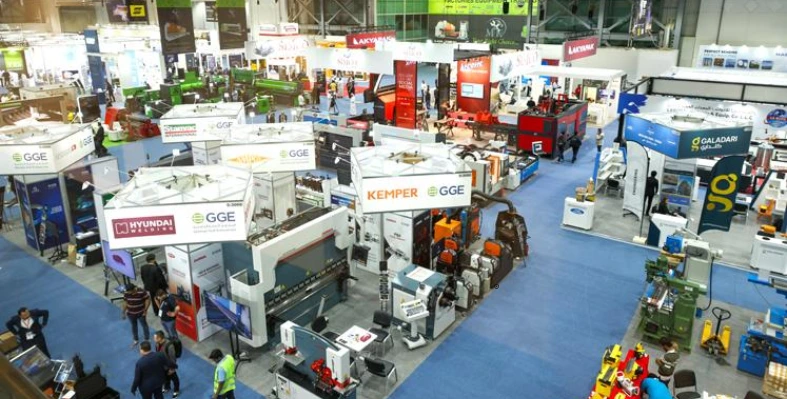
“The exhibition will feature next-generation solutions—from robotics, smart manufacturing, and inline metrology to noncontact measurement and portable 3D scanning, that enhance precision and reduce waste. Sustainability will be central, with energy-efficient tools and lifecycle analysis strategies. By blending automation with human expertise, SteelFab 2026 positions itself as the definitive venue for fabricators seeking resilience and future-ready operations,” said Sultan Shattaf, commercial director of Expo Centre Sharjah.
A major highlight will be the 5th Best Welder Competition, sponsored by ESAB, spotlighting top talent and promoting safety in welding and cutting operations through advanced robotic technologies.
Building on the record-breaking success of its 20th edition, which attracted over 350 exhibitors from 33 countries, SteelFab 2026 is expected to host more than 650 leading brands and showcase the innovations shaping the future of safe, efficient, and sustainable manufacturing.
IVECO and its long-term partner MTT, through EuroMT Srl bodybuilder, have begun delivering 20 Eurocargo units to the Directorate of Civil Defense in Iraq.
The first batch of Eurocargo ML180E28 4x2 models marks the debut of firefighting water tankers in Iraq. Each vehicle is equipped with a EuroMT Srl 10,000-litre water tank and a high-performance firefighting pump system, designed to offer flexibility, efficiency, and rapid emergency response capabilities.
Machine Technology Trading Co. (MTT), an official IVECO dealer for several years, is headquartered in Baghdad with a secondary branch in Erbil, Kurdistan Region. The company provides full coverage across Iraq, offering the complete range of IVECO trucks.
Khalid O. Mawlood, general manager of MTT, said, "We are proud that our local Governorate has chosen our company together with IVECO brand for the fleet of firefighting vehicles and we hope to serve this mission as always we did in the past and we will continue to do."
Ali Sheikholmoloki, IVECO business manager for Iraq, added, “In this special year, which IVECO is turning to 50 years, we are celebrating together with our historical partner MTT the delivery of 20 Eurocargo units firefighting water tankers equipped to Al Diwanya Governorate in Iraq. I can proudly say that Eurocargo is the most versatile vehicle in its category which surely will bring us many more achievements in this market for different segments.”
Eurocargo: a multi-mission truck
Eurocargo stands out as a symbol of reliability, flexibility, and versatility. Designed for a fast-changing and competitive market, the model combines strength and agility with a refreshed design that enhances both aesthetics and performance.
Available in over 11,000 variations, the Eurocargo range includes seven gross vehicle weight options, four power ratings, seven gearboxes, and three cab types to meet any operational requirement. Its bumper design allows easy access to the windscreen, while LED Daytime Running Lights and optional Xenon headlights ensure safer night driving. Every design detail, from the reshaped deflector to the UV-filtered windscreen, improves aerodynamics and comfort.
Cab options for every mission
Eurocargo offers three cab types — Day, Sleeper, and Crew — each available with two roof heights. The Day cab is suited for urban use, balancing width and length for ease of manoeuvrability. The Sleeper cab, available in standard or high roof versions, offers overnight accommodation with one or two bunks and up to 260 litres of internal storage. The Crew cab, ideal for construction and emergency services, carries up to six passengers plus the driver, along with essential tools and equipment.
Most Read
-
-
-
-
-
-
-
-
- Details
-
-
-
-
-
Latest News
-
- Details
-
-
-
-
-
-
-
-
-
-
-
Most Read
Latest News
More Articles
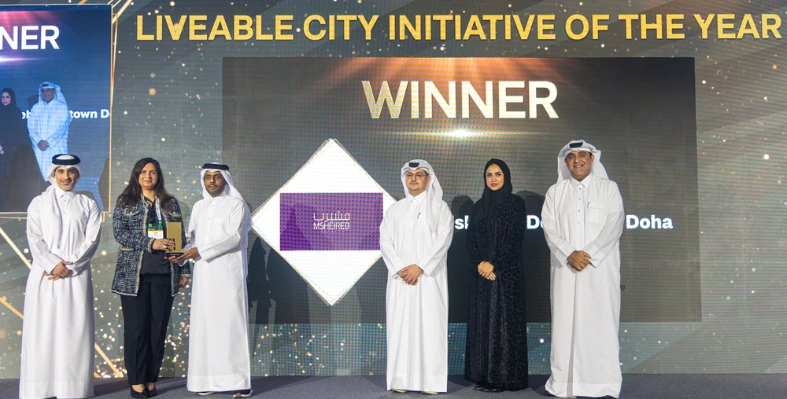
Government participation is strong, highlighting the public sector’s role in promoting sustainable and innovative practices. (Image source: Big 5 Global)
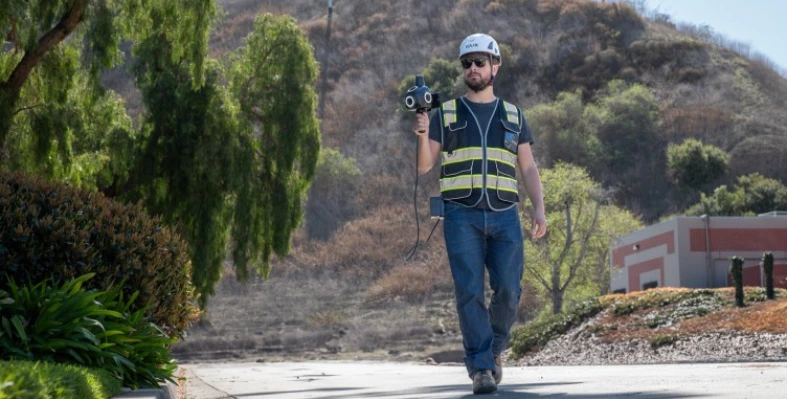
The Looq Platform produces survey-grade, georeferenced, ground-classified point clouds and orthomosaic images. (Image source: Looq AI)
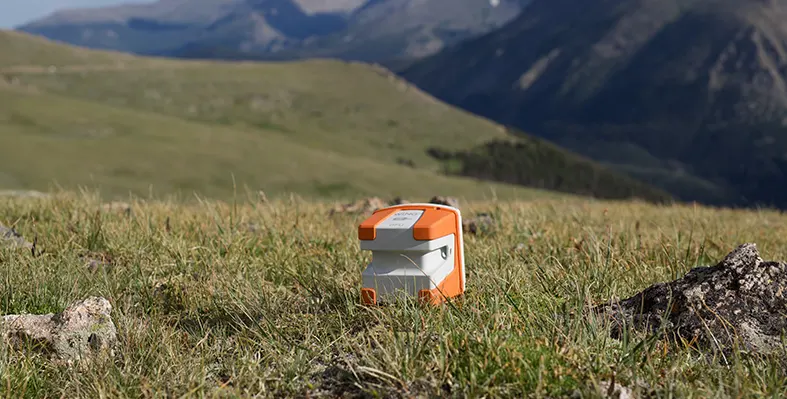
Sercel WiNG DFU-3C passive seismic sensors can be used to image subsurface hydrogen-generating systems with greater precision and efficiency. (Image source: Sercel)

Inspection professionals can quickly detect faults and issues to prevent downtime and extend equipment life. (Image source: Flir)

From 10–12 November, the DRIFTx exhibition will showcase smart solutions across land, sea, air, and robotics.













